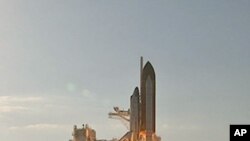The Space Shuttle Discovery is now on its way to the International Space Station after what NASA calls "a picture perfect launch" from the Kennedy Space Center in Florida Thursday. This is the last flight of the oldest and most-travelled of the US shuttles. Discovery and its six-member crew is expected to reach the orbiting International Space Station Saturday.
With thousands of spectators on hand for this last launch of NASA's workhorse shuttle, launch commentator Mike Curie announced the firing of the rockets and the beginning of Discovery's final ascent: "Booster ignition and the final lift off of Discovery, a tribute to the dedication, hard work and pride of America's space shuttle team. The shuttle has cleared the tower."
A last-minute computer problem almost interfered with the launch, the window for which had shrunk from five minutes to three because of weather conditions at the central Florida Atlantic coast launch site. Discovery fired its engines for lift off with only two seconds to spare.
The launch was originally scheduled for November, but the mission was postponed after technicians discovered a leak in the external fuel tank. That led to further inspections in which engineers found cracks in the tank that needed to be repaired.
This was the 39th launch for Discovery. Its first mission was in 1984 and it has flown more than any of the other shuttles in NASA's fleet. It is to be permanently retired after this mission and the other two remaining shuttles, Endeavor and Atlantis, will also be retired after missions to be carried out in the coming months.
On Saturday, Discovery is to arrive at the International Space Station, where it is to deliver a storage module and several tons of equipment and supplies to the orbiting station. Among the items being delivered is a humanoid robot called Robonaut-2, which is to be used for future work in the US laboratory section of the space station. The robot, which consists of a torso, a helmeted head, two arms and fully functional fingers was developed for NASA by General Motors to do routine tasks that will free the humans on board to concentrate on more complex work.
Discovery will arrive at a space station that is already quite active. Just hours before the Discovery lift off from the Kennedy Space Center, the European Space Agency's ATV-2 cargo ship arrived at the space station with tons of supplies and extra fuel. With the addition of Discovery on Saturday, space craft and robotic arms supplied by all five major international space agencies will be at the orbiting laboratory at the same time.
NASA Associate Administrator for Space Operations Bill Gerstenmaier says all the various components and vehicles will be involved in what he described as an "international ballet" in space. "This is a very intriguing time in terms of the number of vehicles going to space station and the activities that are occurring on station. This is probably unprecedented in the history of human space flight, the amount of activity to one single destination, all focused around the same thing and all the partners around the world who are essentially working together on these activities,' he said.
Gerstenmaier says it is possible that the Discovery crew will assist a photo session at the $100-billion space station before their 11-day mission ends next month. NASA and the Russian Federal Space Agency are discussing the idea of using a Russian Soyuz spacecraft to circle around the station to take video and photographs of the unprecedented array of vehicles and modules connected together. A decision on that is likely to come towards the end of the current mission.
US Space Shuttle Discovery Launched on Final Flight




